Cabaret Pt 1: 'You have to understand the way I am, mein herr.'
 Wednesday, August 1, 2018 at 2:30PM
Wednesday, August 1, 2018 at 2:30PM Three-Part Mini-Series
Occasionally we'll take a movie and baton pass it around the team and really dive in. If you missed past installments we've gone long and deep on Rebecca (1940), Who's Afraid of Virginia Woolf (1966), Rosemary's Baby (1968), Silence of the Lambs (1991), Thelma & Louise (1991), and A League of Their Own (1992). Now... Bob Fosse's Cabaret (1972) which is showing this weekend at the Quad Cinema in NYC - Editor
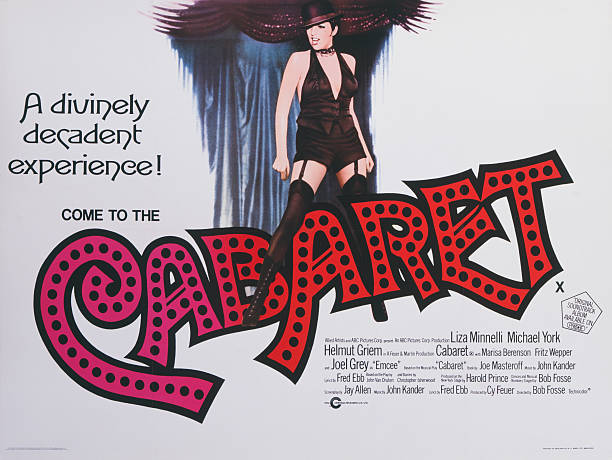
Team Experience is proud to present a three-part retrospective deep dive into Bob Fosse's Cabaret (1972), winner of 8 Oscars, and one of the most singular films ever made. Though it takes place on a stage it's entirely cinematic in a way many film musicals --even the ones that don't involve actual stages -- ever even think to be.
Part 1 by Nathaniel R
00:01 Cabaret begins in total silence with white text credits on a black screen. Countless movies begin this way, but not musicals. There is no bright and colorful title card, no overture to prep you for its famous song score. Cabaret takes place at the dead end of the Weimar era in Germany, and emerged onscreen at the dead end of the musical genre's dominance of movie culture. This is not lost on the genius dancer/choreographer turned film director Bob Fosse, who throws us immediately into a dark and dingy underworld... as if we've already eaten pomegranate seeds and sealed our fate...
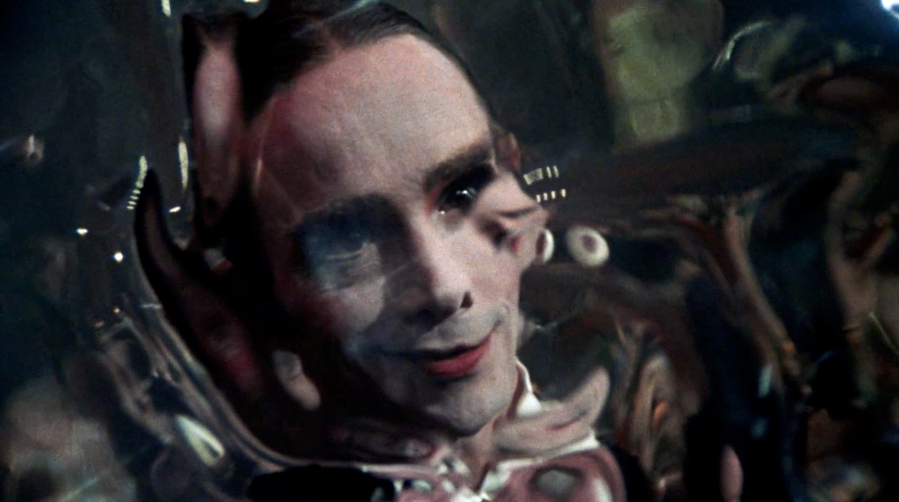
02:08 As the credits continue diegetic sound rises, people talking and laughing, the occassional clink of a glass or silverware, and we begin to see a distorted image, but of what exactly? A band warming up, a drumroll, a shift to color, and then The Emcee pops into frame, his warped reflection staring into camera, and offering us a tilted impish grin. And then Cabaret's famous opening song "Willkommen"
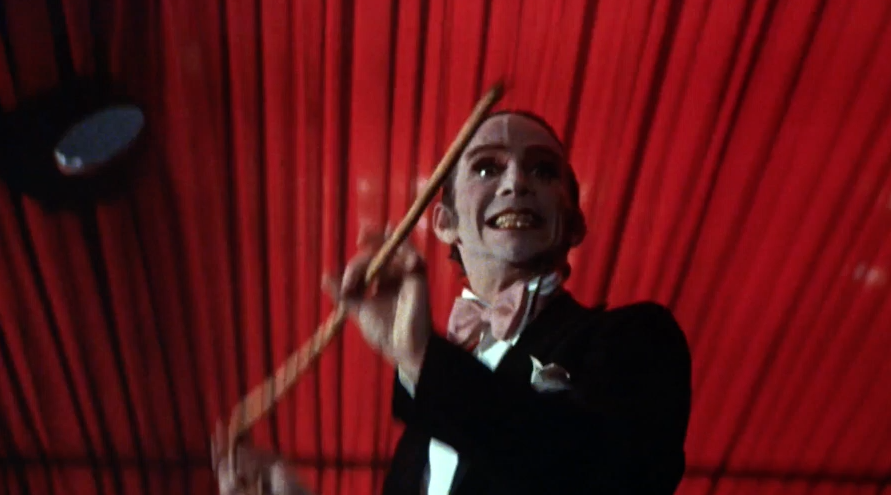
02:35 Notably the first big moment of real color is blood red, the Emcee backing away from the fun house mirrored wall and under the low red roof of the Kit Kat Club's tight stage.


02:41 Cabaret doesn't spend much, if any time, with exposition so it's left to the visuals and the songs to infer time, place, and meaning. I love the split second cutaways to club denizens reenacted Otto Dix paintings, a highly sophisticated way to place you in Weimar-era Germany. Several years ago there was an exhibit of Dix's work at a museum in town and it was really something to gawk at.

02:55 This is our first shot of Brian (Michael York) as he arrives in Berlin while the Emcee is singing "welcome." In most good musicals the songs advance the narrative and work as storytelling. In Cabaret, though, a different approach -- the songs speaking back to the narrative more than telling it, as if in direct conversation.
"Leave your troubles outside.
So life is disappointing. Forget it!
In here...life is beautiful. The girls are beautiful. Even the orchestra is beautiful"
This 'welcome' feels like a trap, doesn't it?
04:21 "And now presenting the Cabaret girls..." I feel like these ladies never get their due -- especially because they're only billed as "Kit-Kat Dancers" in the film, even though they're named individually onscreen and they have to constantly sing and dance and contort their body into uncomfortable positions. Only one of these women ever made another film! I tried valiantly to figure out who played which role for this retrospective but was unable to find much info.

"Heidi"

"Christina"

"Mousey"
I think this is Kathryn Doby, a frequent Fosse assistant, who you can also see dancing in All That Jazz (1979), but I'm not 100% sure. Unlike the other Kit-Kat dancers she actually acted in a few other films, including the original version of The Handmaid's Tale (1990) where she plays "Aunt Elizabeth" so I really wish I could figure out if this is in fact, her.

"Helga"
Helga (Louise Quick) is my favorite and not just because of the all-around-the-eyes blue eyeshadow. I can't get over how completely carnal her face is during these scenes, she's just exuding sex. This makes Joel Grey's "ask Helga" line even funnier when he claims they're all virgins, to much audience laughter.
Quick is also the one who is in the gorilla suit later in the movie dancing with Joel Grey. A favorite of Fosse's she also danced with Liza in the TV special "Liza with a Z". Get this: whenever you're hearing Liza's footsteps in the sound mix, it's her footsteps because apparently Fosse kept her around for post-production, too. [Here's an interview with her if you're curious.]

"Betty"

"...und Inge"
Doby and Quick were the only English-speaking dancers among the Kit-Kat girls. I spend this bandwidth on the Kit-Kat Girls introduction for another reason, too. Which is to show how exquisitely and perversely Bob Fosse "welcomes" you into the movie. While the Emcee is singing "Velkommen," the editing keeps giving us slivers of Brian (Michael York) arriving in Berlin. The Kit Kat dancers moves become frenzied with kick lines and the like, the camera taking them in from multiple angles including directly underneath them! (I think we can be reasonably certain that Baz Luhrmann consumed this movie intravenously as a younger man.)
...and then, before you've even realized it, Sally Bowles (Liza Minnelli) has entered the film.

06:11 This is your first shot of Liza above; She's the one in the red gown, headless. She's just kind of sauntered onto the stage in the midst of the introductory chaos while another performer is about to bend over into a pretzel shape, ass-out to the crowd. Cabaret was, of course, a sensational star vehicle for Liza Minnelli, winning her the Oscar, but within the Kit-Kat Club, Sally is just another nobody trying to make a dime and maybe become somebody.
I don't think it's any accident that all three of the film's stars are introduced in shots that distort, obscure, or disfigure them, though this is literally the first time I've noticed it.

06:15 Even when the emcee introduces Sally to the audience, our view is obstructed by Heidi's ass! Sally is out of focus before she's even finished her bow, the camera already lustily darting to someone else. This non-star star entrance for Liza is, for me, a beautiful callback to her mother Judy Garland's funny just-a-chorus-girl intro in Easter Parade.

06:46 One of many dirty visual gags the emcee makes even cruder with his oversized reactions to draw attention to them. Joel Grey is genius in this movie, somehow never stagnating in the part despite playing it hundreds of times on Broadway before even filming this.

"Divine decadence"
07:28 Brian and Sally meet cute through a chained door. Liza's Sally wants to be an "international woman of mystery" but has failed. But at least she has great comic timing. I love that as soon as he's said his name is Brian, she abruptly decides he's safe to let him and immediately calls him "darling" and starts spilling the house secrets.
08:41 The tour of the boarding house. Liza's incredible physicality as an actress is put to expert use in this scene, it's there in the little hand gestures when she's describing her neighbors, the way she straightens up all proper when she passes other tenants only to slouch again when she's out of view and comfortable with Brian her old pal of two minutes. Sally has trouble with time. When she says "forever" she means "three months" and so on.

What else do you need in a bedroom besides a bed."
09:20 Brian isn't impressed with the size of his room so Sally offers her room for his tutoring lessons, which gives her an excuse to spend more time with him. And to keep talking and she LOVES to talk.

10:29 "So you're moving right in, okay?" There's something so endearing about Sally's instantaneous affections and requests that sound a wee bit too much like needy demands. The scene ends with a wonderful bit about a peppermint flavored hangover remedy.
Sally AND the film move so quickly that as soon as she shoots Brian a completely enamored look we're racing to the stage for our next musical number.

11:09 The editing, influential with its breakneck speed and too-soon cuts (MTV and then Moulin Rouge! will take this impulse to even greater lengths of dizziness), already has us back at the Kit-Kat Club where Liza is hurrying to the stage to sing "Mein Herr". Such a great sound mix / acting flourish that she is reciting all the jokes from backstage as the Emcee, unseen, recites them onstage. They've done this a hundred times. The production design is so inspired, note how cramped her "dressing room" is, despite not really having any walls, and that she has to wiggle in and out of it.

11:32 "That international sensation, fraulein Sally Bowles!". I once read a review that suggested that Liza Minnelli was TOO talented to play Sally Bowles, the thinking being that the role should be played by someone with meager talents to better exemplify Sally's non-stardom. Baloney! The obvious dichotomy between Liza Minnelli's enormous musical gifts and Sally's impotent dreams of stardom within the cramped chintziness of this particular cabaret at the end of everyone's world (SPOILER ALERT: The Nazis are coming) is absolute electricity for the film. Life is full of contradictions, and tiny chintzy performance spaces in real life do sometimes contain super talented people who may never catch that one big break.
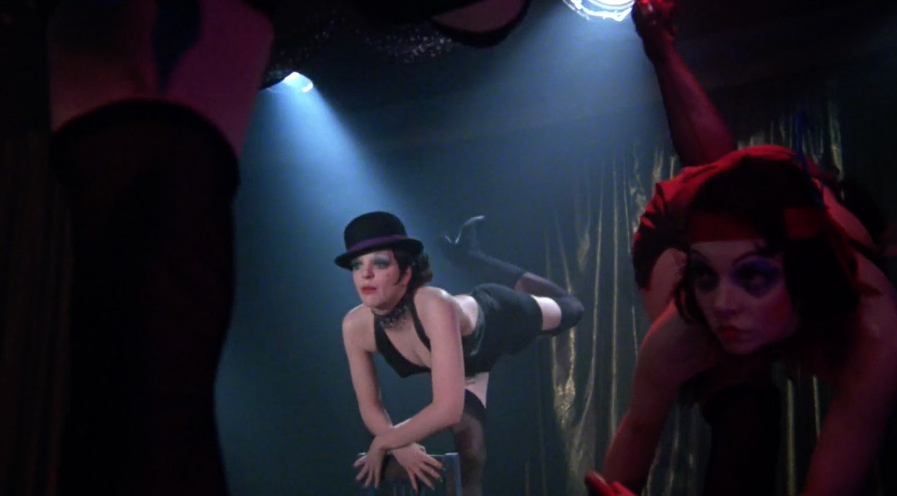
12:00 I shot about 25 frames from "Mein Herr" and realized it was never going to work to pick out favorite moments and choreographed details because every single shot, hand movement, leg drop, prop business... everything is thrilling. Today's directors don't seem to understand how to shoot dance onscreen, regularly cutting off people's feet randomly, whereas when Fosse does it, it's just inspired. He throws everything at the musical sequences: closeups, different angles, full body shots, lighting tricks, but because he's so talented at both musicals and direction, the result is that the camera and the editing become part of the choreography, not a crude attempt to merely shoot it or, worse, interrupt it frequently with non-meaningful shots to make it "cinematic".
True Story: the very first time I tried to watch Cabaret I was a kid and it was playing on late night TV. My mother walked into the living room and looked at what I was watching and said 'I wish you wouldn't watch that. That's a disgusting movie!' I always think of that when "Mein Herr" starts -- that must have been when she walked in to see her little Mormon boy completely mesmerized by a screen goddess who was FEELING herself (at one point, quite literally) and singing with pride about being a big restless slut!
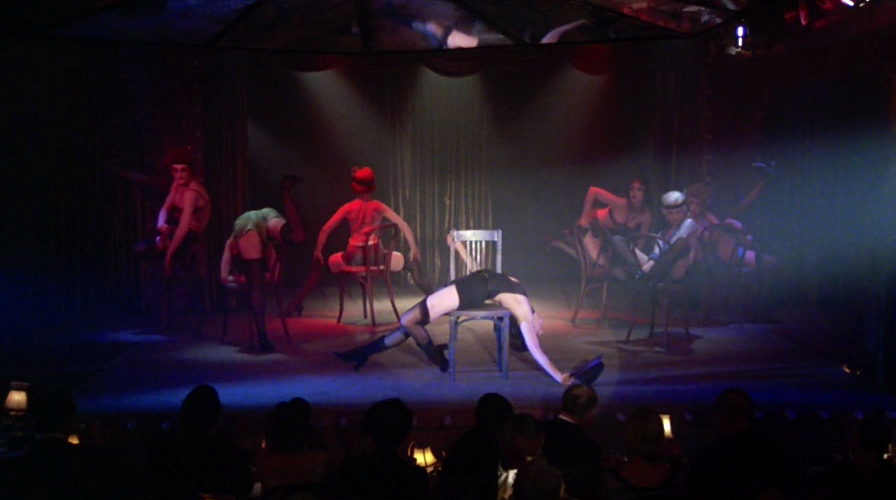
15:02 That final beat of the song. That collapse with back arched. "Sensation," indeed. I die. It floors me every time. If I ever would make a list of favorite musical sequences onscreen "Mein Herr" would be in the top ten. Ever. Liza's mom would surely top the list but I'm sure Liza would be okay with that!

You've got to try one of these. They're absolutely devastating. I'm sure they're filled with opium... they make me feel wildly sensual!
16:33 Sally can't stop talking but she's so hilarious we can listen to her on a loop. Sally hooks Brian and Fritz up for English lessons, before she whisks off to entertain men. Meanwhile the Emcee presents some mudwrestling between two ladies on stage. As Fritz begins to talk about the economy...
18:07 ...we get our first shot of a Nazi, in the crowd. A smart screenplay choice to connect the rise of the Nazis to an offhand comment about economic collapse. As if psychically agitated by the Nazi's presence, the editing becomes suddenly frenzied, the mud wrestling, the Emcee, the crowd, the audience laughter are all increasingly grotesque.

19:12 The madness escalates and the sick punchline is this self-administered swipe of mud above the Emcee's lip -- a Hitler gag that's only funny to the people in the room. To the audience watching a period piece, who all know what went down in the 1930s, it's harrowing.

19:28 A quiet moment amid the chaos, but still confusion. A great shot of Brian and Elke (Ricky Renée) standing at the urinal together. Brian does a slight double take before a friendly smile as he exits.

19:55 She is a strange and extraordinary person! Some musicals die inbetween the musical numbers but Cabaret is compelling even when it's just simple conversations. Partially because Sally is such a one-of-a-kind character, but also due to the masterful cinematography, acting, editing, direction, design work (how were the costumes not nominated -what?!). I love the beat in this casual stroll scene where Brian, at Sally's bidding, has begun to talk about himself, and Sally immediately interrupts to talk about a movie star she absolutely loves.

20:20 "Do I shock you darling'?" "No, not a bit." "I don't?!?" These strolls with Brian have amazing dialogue. On their next stroll we learn about Sally's father. Or rather her delusions about him, and it ends with one of the great non-sequitors in all of cinema. "Have you ever slept with a dwarf?"
21:20 A great meta moment as Liza, going big for one of Sally's big moods, makes a ton of faces and then says she no longer likes that movie star she was talking about two scenes earlier because "she makes too many faces." Hee!

22:03 The train scene is as delightful to watch as it is for Sally to experience. It's a moment of nearly erotic abandon but also childlike in its innocence. Such a lovely scene, especially once Sally starts egging Brian on to scream with her at the passing trains.
23:40 But happiness, even in-the-moment happiness can't last in 1930s Berlin. At the exact split second when Brian and Sally will be screaming in gleeful unison, a smash cut to vicious Nazi violence which is itself crosscut with more of the Emcee's antics on the stage.

26:37 Sally pretends to be cold to get hugs from Brian. "Tighter" Sally's awkward come-ons barrel forward into very nonreciprocal kissing.

27:25 Liza's body language is just hilarious in this sequence, another example of great instincts and control while playing an out of control woman who acts on every instinctual whim. When the kiss is rejected her body suddenly stiffens up, all business like -- for the business of seduction, that is! -- she retreats only to return with a record player, reset the mood, and pointedly close the door. And then it's right back to her trademark liquid body, dancing with her upper body, particularly the arms and hands and sliding onto Brian's bed again with the immortal line...

Doesn't my body drive you wild with desire?"
28:00 ...Which she instantly spoils for another punchline with her neediness. "WELL, DOESN'T IT?!"
29:38 A frank discussion -- well, frank for 1972 cinema -- about whether or not Brian is queer. "All right. If you insist. I dont sleep with girls. The word for my sex life now is nil." Sally doesn't like the answer but relaxes again.
Her "Why didn't you say so?" protest with the melancholy realization that they can just be best friends is perfectly played... if half-hearted. Sally doesn't give up easilly.


How do you do?
34:00 Foul-mouthed Sally and her gold-digging friend Fritz 'accidentally' end up sitting down for tea -- against Brian's wishes -- with his new English pupil, a very rich and proper Jewish woman named Natalie Landauer (enter Marisa Berenson). What could possibly go wrong!
CONTINUE TO PART 2 WITH DANCIN' DAN



Reader Comments (24)
This is brilliant! So keenly observed and so very well written.
Regarding the old comment about Liza being too talented to play Sally Bowles...
The first time I watched, it felt like we were hearing Sally sing the way she imagines herself to be. Notice how bored and disinterested the audience members are when she belts out "Maybe this Time," one of the all-time great performances in musicals and film.
Love reading this! Thank you.
That German lesson Sally and Fritz crash is one of the funniest screw ball comedy scenes ever, esp if you are bilingual. "Bummsen!"
By the way, the man being brutalized by the Nazis after the train scene is the same character who kicked out the Nazi out of the club during the mud wrestling scene. This movie is so full of brilliant details, one could go on and on.
And anal PS: It's Inge, not Inger.
Has ever a Supporting/Lead combo of Oscar winners ever been more deserving.
I recently rewatched the film and it has to be the slickest and quickest two-hour film I've ever seen. Regarding whether Liza was too talented to play the part I believe this is the case of the musical version. The film version is a completely different animal to the original 60's musical which is why I'm fine with Minnelli's casting. Personally, I think it's genius casting as Minnelli a child of classic musical film is placed into a world where no one has the time to appreciate talent as truly horrific events are happening in the world.
I really wonder how people can prefer Godfather to Cabaret. I mean sure we shouldn't be comparing the films but personally, I think the achievement of Cabaret is an even greater feet. Joel Grey and Liza are just so marvelous in the film that it has to be one of the greatest musical duo's to win the Oscar prizes. How Cabaret was not nominated for costume design or original song for both Mein Herr and Money Money (both were written for the film) is beyond me.
There's a throwaway line where Sally says, "I know I can sing, but I want to act!" I always felt that they must have added that when Minnelli was cast, but again, those dreams of stardom (and even all that potential) hardly matter when we all know what's coming. Great start of this series for a film that's a triumph on every level.
Just a lovely look at one of my favorite films of all time. The detail! I won't even have to watch it again, will just look forward to Part 2!
Biggs -- thank you so much
Danny -- Inge looks like she can take it either way
Mark -- i want to say no?
Eoin -- the Oscars are baffling sometimes. I'm glad it won a ton of Oscars and holds a curious record at least.
Val -- YES. I shoulda mentioned that line.
rrich7 -- i hope you love the second and third parts. I'm excited to read them myself.
Fabulous writing Nat for a fabulous movie. Fosse is so heralded as a choreographer that it seems silly to say, but I think he's vastly underrated as a director. This and All that Jazz are towering achievements.
And Liza, what a genius comedic/tragic performance. Just brilliant!
when i first saw cabaret as a teen it really opened my eyes to what film could be. up until then it was just actors and stories but this made me realise the power of craft - design, cinematography and especially editing. i still geek out at the framing of the kit kat girls' hands during "not only up and down but side to side, mein herr". every film since has had to live up to this film's greatness [none has]
i love everything about this film and everything about this article
I'm so glad you brought up the talent level of the person playing Sally. It's something people also bring up with regard to the role of Roxie in Chicago, and i think both play just as well either way. What I love about the casting of Liza here is that the way Liza plays her, you totally believe that she may have the talent to become a big star, but she's SO flighty that she probably had the chance at some point and let it slip through her fingers because of some other whim, or that she's too scared of success because it would tie her down to something. It's a far richer version of the character than when she's played as someone of average/below-average talent, in which case she's "just" delusional.
I have to say though, that as a choreographer, as much as I LOVE "Mein Herr", there are times when I don't like the way it was shot and edited, because you can't always see all of what the ensemble girls are doing with their bodies, and it's just GENIUS choreography. But of course, when you have Liza doing THAT, who really wants to look at anything else?
Hope you all enjoy Part Two tomorrow! ;-)
God bless Joel and Liza.
When I was but a young student of the Oscars, Cabaret was always fascinating because of its record. I guess later this month we'll be talking about whether Marisa Berenson should have had a chance to further bolster that record.
I too lived reading this and I can"t wait for parts 2 and 3. Cabaret is great and Fosse was a real genius.
Something in particular that I like about your write-up, Nathaniel, is the way in which it teases out how the style of the film is an essential component of its significance. Not only does the film showcase Fosse's choreography beautifully, it also shows that he was thinking across the entire design of the film, using the dramatic sequences contrapuntally with the scenes in the club to ensure that the whole film is "musical" in its effect. He had a profound understanding of how music and songs can be cinematic.
Re: the Oscars, The Godfather is great in the ways that it's great and Cabaret is great in the ways that it's great. I don't think that The Godfather can be considered the wrong choice for Best Picture. It's surely one of the best films ever made! But the record that Cabaret set is a clear sign that the Academy held it in extremely high regard. And thankfully Fosse got an Oscar in his career. And Liza and Joel - yes, perhaps the best leading/supporting duo to win.
So good! Always great to read someone else's interpretation when a movie has so many layers!
Edward -- and in a way it's probably better that Cabaret lost. We all know how people turn on Best Picture winners... especially if there's an easy way to denigrate them so even though Cabaret is a masterpiece people would be all like "they couldn't get enough of musicals!" and dismiss its win.
This is just so brilliantly written. All the details you notice are new to me and I love this film and have seen it multiple times.
That's such a good point about Fosse's advantage as both a director AND a choreographer. He knows exactly how his moves should be seen. It's exactly what today's directors don't get - even music video directors. They so often cut away from the best choreography. They just don't get it! It drives me crazy.
Plus, Nat, I think now you have to do a Tuesday Top Ten of favorite musical sequences, right?
Nathaniel: Great point. It would be such a shame if Cabaret had received a backlash like that.
The historic Oscar win fairly gives Cabaret a tie for Best Picture.
What a great write-up! I learned so much that I can't wait for the next analysis!! One of my very favorite movies of all time!! My favorite dialogue -
"Okay.
l'm self-centered, inconsiderate...
...and what was the third adjective?
Oh, yes.
And l have this infantile fantasy...
...that one day l'll amount
to something as an actress.
A dinky little cottage in Cambridge?
A playpen in the bedroom,
diapers on the towel rack....
How soon would it be
before we started hating each other?
How soon would it be before
l started dashing out...
...disgracing myself at some nearest pub?"
FYI, this is playing at the Quad Cinema soon for anyone living in NYC. Along with a few other Bob Fosse films!
This is a really beautifully written and observed piece, Nat, thank you.
I love Liza's green nail polish so much in that last shot - it feels subversive for the era.
About Liza being too talented to play Sally Bowles. Ridiculous. If Liza herself didn't have her stellar parentage and was stuck in a foreign country in the 30s this is probably exactly where she'd end up. Too flaky to get by on pure ambition, and too "unusual" looking for the movies of that era, Sally/Liza would be happy to have a paying job as a performer. I personally know many people who are amazing singers and actors who never even really got THIS level of paying job for their talents.
But anyway, my favorite part of this write-up is Nathaniel's interaction with his Mom because it's so similar to mine, except that I was able to sneak the portable black and white TV into my bedroom and watch this on PBS because it started at around 11:30. This must have been about 1974 or 1975. My Mormon mother would never have allowed it so thank god for the late show!
PS true confession - I have NEVER seen this movie on the big screen even though I've surely seen it 20 times by now. I was too young when it came out the first time, and have never seen it revived on the big screen.
I've also noted the throwaway "star entrance" before and, after thinking about it, felt like it was Fosse's considered decision to give Liza's Sally her grand entrance into the film at the opening of the boarding house door where it could be done properly.
This is beyond fabulous. What a great observation that the three main characters are distorted upon our first glance at them. As always, I loved reading your perspective.